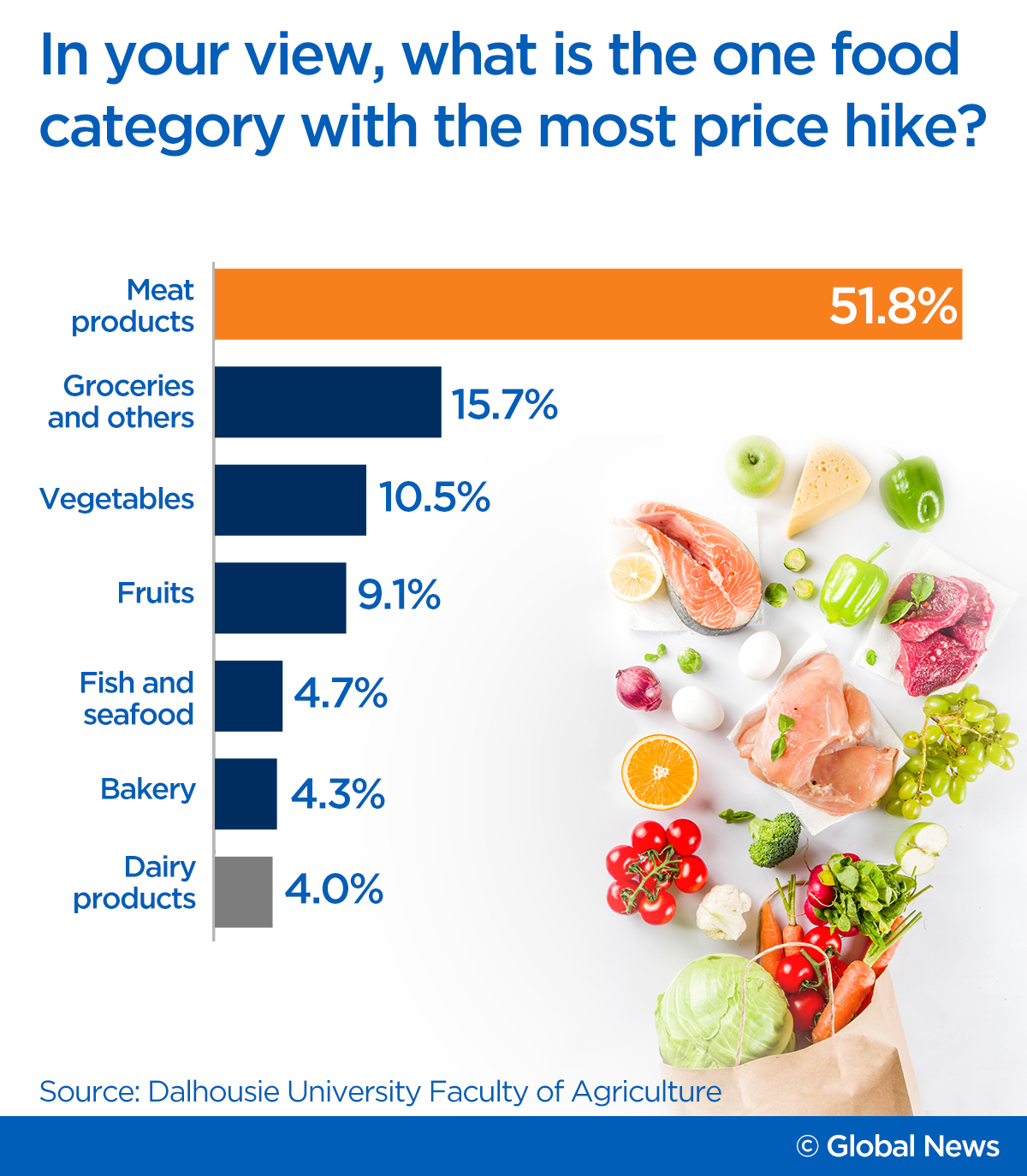With prices rising along with inflation in Canada, some 40 per cent of shoppers are focusing on sales and deals more than before when buying their groceries.

A new report from Dalhousie University’s Agri-Food Analytics Lab found 86 per cent of Canadians surveyed believe food prices are higher than they were six months ago. As a result, two in five people said they have changed their behaviour at the market over the past year in order to save money.
“I’m a really good shopper,” said Kim, a 45-year-old Vancouver resident who did not want her full name to be used. “I’m always looking for sales and stuff. But this year, it’s been hard. I’ve had to step my game up.”
Inflation has been felt in Canada and many other countries as the world economy slowly recovers from COVID-19 pandemic. The early months of the pandemic saw prices fall amid lower demand as people stayed home and large sectors of the economy shuttered for months.
Now that stores are opening up again and people are re-entering society, demand has soared as manufacturers and agricultural businesses struggle to keep up.
Overall, Canada’s inflation rate this year grew to 4.1 per cent — the highest since 2003, according to Statistics Canada.
While Statistics Canada estimates the consumer price index for food has risen 2.7 per cent over the past year, the Dalhousie University team says it has found the inflation rate is closer to five per cent.
Both groups agree, however, that meat has seen the sharpest price jump compared to other foods, with Statcan estimating a nearly seven per cent rise compared with August 2020.

The Dalhousie survey, which collected views from more than 10,000 people during September, suggests nearly half of Canadians are buying less meat than they were six months ago, with more than half saying meat prices have increased the most during that period compared with other foods.
Canadians who answered the survey also noted increased prices on fruits, vegetables, fish and bakery products — a trend researchers say is unusual compared to previous years.
“Every section of the grocery store is impacted by inflation — there’s not one single section that has not been impacted,” said Sylvain Charlebois, director of the Agri-Food Analytics Lab and a professor at Dalhousie University, in an interview with the Canadian Press.
“Typically, you would talk about cauliflower or beef or tomatoes. This year it’s different products across the board.”
The report found that around 40 per cent of respondents are using more print and digital coupons than they did last year. A similar number said they are buying more discounted products that are near expiry compared to 2020 as another way to save money.
Kim said she has been buying more private label, or house brand, products to further save money — something more than one in three Canadians surveyed also said they did — along with scouring for coupons in weekly mail flyers and online.
But she’s also found that her grocery cart has been less full than it was earlier this year, and tries to stretch meals across multiple nights more often.
“Definitely less steak nights, that’s for sure,” she said with a laugh. “Maybe once a month we’ll treat ourselves, but that’s about it.”
Bryce, a Calgary resident in his 30s, said he’s also noticed the price of fruits and vegetables has “skyrocketed” since last year, making it harder to ensure his two grade-school children have healthy meals.
“It’s a tough balance,” he said. “I find myself sometimes leaving some things behind at the checkout to make sure we can bring home (fruits and vegetables).”

The Dalhousie survey found around 10 per cent of respondents said fruits and vegetables have increased in price the most during the past six months compared with other groups. The study authors, however, noted that produce prices have generally been cheaper during this period.
Statistics Canada found the prices for many vegetables appear to have actually gone down in the consumer price index compared with last year, while the prices of some fruits — notably apples — have increased.
The survey also found that while 86 per cent of all Canadians believe food prices are higher than six months ago, that observation was highest among the baby boom generation with 93 per cent noticing higher food prices.
Bryce said that younger Canadians like himself and his friends are also feeling the squeeze, and that he is hopeful that prices will start to come down again as the economy further adapts to the pandemic reality.
“I definitely don’t want to be gouged if there’s another lockdown,” he said. “Hopefully, it will all calm down soon.”
Looking ahead, Charlebois said food prices are expected to remain elevated as shipping, labour and other input costs are projected to remain high.
Global food prices rose 30 per cent year-over-year in August, an index compiled by the UN Food and Agriculture Organisation shows.
— with files from the Canadian Press and Reuters
- Trudeau tight-lipped on potential U.S. TikTok ban as key bill passes
- Canadian man dies during Texas Ironman event. His widow wants answers as to why
- Hundreds mourn 16-year-old Halifax homicide victim: ‘The youth are feeling it’
- On the ‘frontline’: Toronto-area residents hiring security firms to fight auto theft







Comments